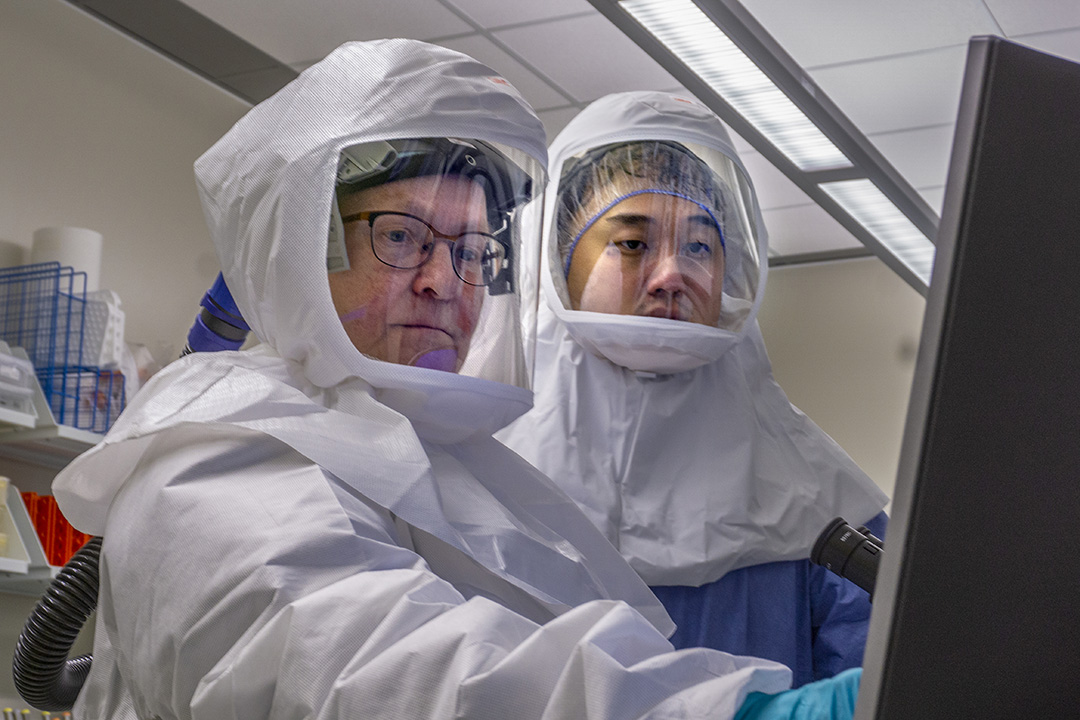
VIDO gains provincial support towards becoming a ‘Centre for Pandemic Research’
Today the Government of Saskatchewan committed $15 million to support the University of Saskatchewan’s (USask) Vaccine and Infectious Disease Organization’s (VIDO) position as a Centre for Pandemic Research.
The support will contribute to upgrading and expanding VIDO’s containment infrastructure and support its role in Canada’s response to emerging infectious diseases. Scientific training will also be a fundamental aspect of the centre.
“We are very grateful for this substantial investment from the government of Saskatchewan,” said USask President Peter Stoicheff. “USask researchers continue to demonstrate how local solutions have global impact, including VIDO’s efforts to combat both the present COVID-19 crisis and future pandemics. That work is part of USask’s commitment to be the university the world needs, and would not be possible without the provincial government’s crucial support."
This funding is in addition to the $250,000 committed by the City of Saskatoon last week.
VIDO has more than 45 years of expertise researching emerging infectious diseases and developing vaccines. The centre will leverage over $225 million in containment infrastructure already in place, including the International Vaccine Centre (InterVac) one of the largest and most advanced containment level 3-agricuture (CL3-Ag) research facilities in the world. VIDO is also constructing a pilot-scale vaccine manufacturing facility in InterVac.
“Infectious diseases continue to pose a threat to Canada and the world,” said VIDO Director and CEO Dr. Volker Gerdts. “This centre will help ensure that Canada has the research and development capacity to be prepared for the emerging human and animal infectious diseases of the future.”
To work with all human and animal pathogens, VIDO plans to upgrade areas of its CL3 facility to the highest containment level (CL4). This space would complement the only other CL4 labs in Canada at the Public Health Agency of Canada’s National Microbiology Laboratory and the Canadian Food Inspection Agency’s National Centre for Foreign Animal Disease in Winnipeg.
VIDO also aims to expand its pre-clinical research and development capacity with a new containment level 2 animal facility that would house a wide range of animals, including bats.
“The centre builds on VIDO’s roots in veterinary medicine and expertise in developing animal models of disease,” said Ryan Thompson Chair of VIDO’s board of directors. “This is important as most new and emerging human infectious diseases originate in animals.”
VIDO has been at the forefront of Canada’s response to the COVID-19 pandemic — this includes being the first in Canada to isolate SARS-CoV-2, the virus that causes COVID-19, the first to develop an animal model of disease, and is now the first university organization to have a COVID-19 vaccine in clinical trials. In addition, VIDO has engaged with over 80 organizations throughout Canada and the world to support the development of their novel vaccines, antivirals and therapeutics in an effort to help end the ongoing pandemic.
“The provincial government is supporting the important work of VIDO at University of Saskatchewan and scientific research that tackles diseases with devastating effects on the health of humans and animals, and prosperity of people around the globe,” said USask Vice-President Research Baljit Singh. “The establishment of a Centre for Pandemic Research at the university, and in Saskatchewan, a source of pride and offers proof we have an important role and position on the world stage.”

